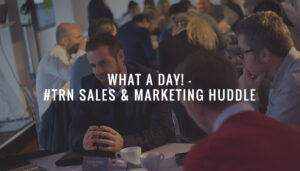Steve Ward, Head of Staffing Agency Solutions for Candidate.ID gives us his insights into using content to bring in inbound inquiries as recruiters.We’ve spent much time in recent years tackling our recruitment agencies’ digital presence. To differing degrees of success, it is fair to say.
Well of course, the nature of content is alien to recruiters. I’ve been there, working with successful recruiters who would love to write some content (erm… maybe), but frankly don’t have time. They have jobs to fill. Will content make this month targets? Not a chance.
And this is true. Marketing with content typically delivered minimal tangible ROI and doesn’t fill your current jobs.
But hang on, I ran a successful recruitment agency for 9 years that was wholly built upon different flavours of content, marketing and online and offline visibility. Branding, largely. 100% inbound business was the result. So why do we have the dissenting voices…?
The answer in most recruitment agencies case is that we’re not set up to produce, market and track content marketing. We’re not really even adept at maximising value from our websites. Do we really know who reads our jobs pages? Usually only the ones who click to apply.
The role of the Marketing specialist within recruitment agency-land is more prominent and essential than ever. Do you have one? Or a team of them?
The candidate and customer journey you see, has changed. McKinsey evaluates that there are 16 points of digital presence in the digital research journey. Candidate.ID co-founder Scot MacRae calls it ‘the Flight of the Bumble-Bee’, as we consume micro-moments of content and knowledge from device to device, from page to page. Consider when you buy a holiday. Do you walk into a travel agent on the high street on impulse and order a holiday inside 30 minutes having been presented with options? No. Typically, we spend considerable time online researching, reading, getting reviews, asking for recommendations, looking at pictures and imagining yourself there. THEN, and only then, do we click to talk to someone, or buy.Imagine therefore the decision of changing careers. As agencies, we might get them earlier; but still the discerning candidate will want to check out our website, looked at our LinkedIn profiles, see if we have any authority on the subject for which we recruit, and whether it appears as though you’d have the kind of roles they’d even want.
Sometimes, they then contact you. Same for your client prospects. Same for the great recruiters who are considering a move.
So, given this change of behaviour in recent years, what are the impressions that you are leaving when someone visits your website, looks at your LinkedIn presence, or tries to research your company? Would you call you? Is there sufficient evidence? It’s the digital customer’s prerogative to exercise choice and move onto the next agency if they don’t see what they want, and pretty damn quickly. And we never knew they were there.
And, given that LinkedIn tell us that less than 20% of people are actively looking at new roles at any given time; what are we doing to nurture the other 80% who are way off caring about job content, but you want them to think of you first when they do?
It’s the role of our content to inform and inspire and draw greater familiarity and commonality with our business. Recognition and authority come through a voice that spreads beyond job news, but also into industry leadership, knowledge and talent trends expertise. Consider that all forms of content are the windows into your business. Are you one dimensional, or do you have more layers? Do you drive both professional value AND emotional connection?
The shift of power when a client, for example, chooses YOU, rather than submitting to a sales call changes the definition of the relationship. They invested in you, so they will stick around longer. Your content, your reputation and your authority defines that they were compelled to choose you and therefore they won’t just give you the scraps at the bottom of the barrel.
So why lead generation? Well technology that supports content marketing has moved on a grade. I recently write a couple of white papers for talent pipelining software Candidate.ID, and they look into the change of the relationship between agencies and their candidate and client audience, as we use smart technology to make more informed choices as to who we call, and who do we do not. The goal with well-chosen new technology such as Candidate.ID, is that you have the insights as to who is reading your content, viewing your web pages, and drifting onto your job postings, at any given time. If you start with contacting those latest 20 people first, you’re likely to have a higher conversion rate – rather than hitting and hoping from LinkedIn searches.
That’s lead generation from your digital content, and that is powerful. And, with GDPR on the tips of our tongues right now, any evidence of legitimate interest shown by candidates and clients as they peruse your content and read your emails, means you can keep them on your database. This however requires you to keep a fluid and diverse content programme to aid your brand and retain their attention.
So, I say again, if you don’t have a marketing/content person in your recruitment company right now, you really need to. The 2018 marketing manager in your recruitment agency, will now be a tangible lead generator and generate ROI from content. Exciting times.
If you would like to download my white papers, please click here: http://candidateid.com/info-for-staffing-agencies/#white-paper
Share :




